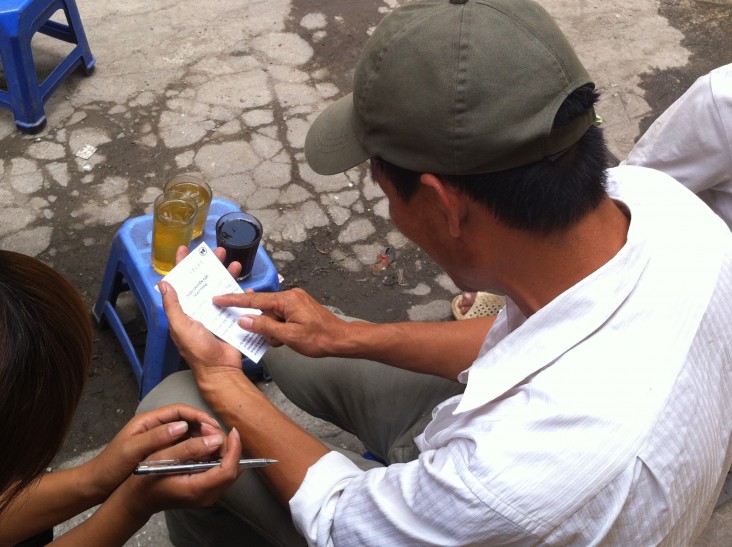
August 2015—In a quiet alley in the southern part of the capital city of Hanoi, a man and a woman are seated on small plastic stools, conferring in low tones. The man drinks a glass of tea while the woman pulls out a sheaf of perforated papers—referral slips—and begins filling one out. She hands the slip of paper to her companion and explains its purpose as he sips his drink, nodding.
He thanks her, slips the paper into his pocket, and finishes his tea. The man rises from the stool and his wife, waiting just around the corner, takes his place. More tea is poured and the quiet conference continues.
This is a front line in the effort against HIV/AIDS in Vietnam, an epidemic in which more than 70,000 lives are lost each year.
The woman, Lien Thi Mai Nguyen, is a former drug user and sex worker who now works with the Sustainable Management of the HIV/AIDS Response and Transition to Technical Assistance (SMART TA) program, supported by USAID under the President’s Emergency Plan for AIDS Relief. She is a community-based supporter (CBS); her companion is an injecting drug user who lives with his wife in Hanoi. The referral slips that Nguyen gives the couple will be used for enrollment at their local outpatient clinic, where they can receive testing and treatment services for HIV and methadone maintenance treatment.
“Because I used to be a sex worker, I understand the needs of the group and want to help them identify risks and protect themselves,” says Nguyen.
CBSs like her are an integral link in the chain that connects high-level decision- and policymakers with the myriad individuals and families throughout the country that are affected by HIV. CBSs are tasked with reaching key populations, helping them to get tested for HIV and to enroll in care and treatment services if they are HIV positive. These men and women work across the entire cascade of HIV services and can re-engage clients if they drop out of—or cannot access—necessary services.
USAID’s program has introduced new approaches to improve the CBS system and ultimately connect more people to services, especially those in hard to reach communities. The Enhanced Outreach Approach, which started in January 2014, is a mentorship program that capitalizes on the experience and authority of upper-level advisers to train and mentor fieldworkers. Master trainers and technical assistance providers in provincial AIDS committees and district health centers educate their staff and colleagues on the approach and provide daily support to the health educators and supervisors who oversee CBS workers such as Nguyen.
Another unique aspect of the Enhanced Outreach Approach is the performance-based incentive, which rewards tangible results. CBSs receive compensation that is directly proportional to the impact they have made, such as helping individuals learn their HIV status, enrolling people in care and treatment services, or re-engaging patients who have dropped out of treatment.
The 2014 Vietnam AIDS Response Progress Report found that just 24 percent of people living with HIV, 29 percent of men who have sex with men, and 35 percent of female sex workers reached in HIV prevention interventions were tested for HIV and received their test results in the last 12 months.
However, between May 2014 and April 2015, the SMART TA program’s outreach efforts reached 32,836 key population individuals. Of these, 28,081, or 86 percent, were tested for HIV. Three percent of those tested, or 752 people, were found to be HIV-positive and subsequently enrolled in care and treatment services.
Just one CBS like Nguyen can reach up to 198 individuals a year and connect them with HIV testing and counseling services.
The SMART TA program, which runs from 2011 to 2016, is designed to train local institutions to take over full operation of services to prevent the spread of HIV/AIDS.
LINKS
Follow @USAIDVietnam, on Facebook, on Flickr, on YouTube







Comment
Make a general inquiry or suggest an improvement.